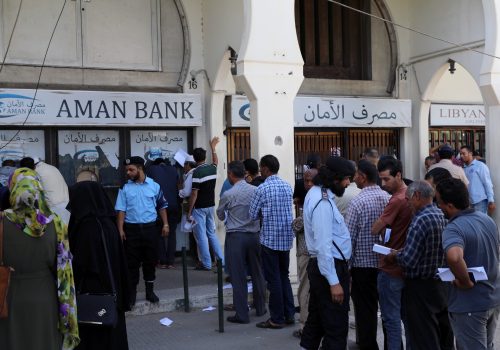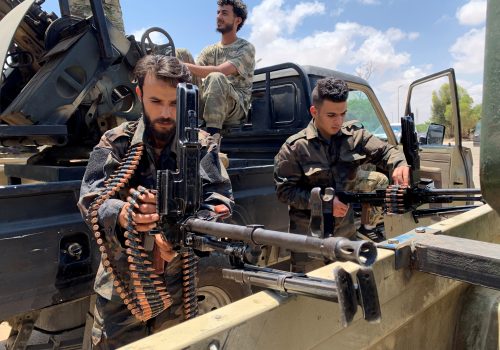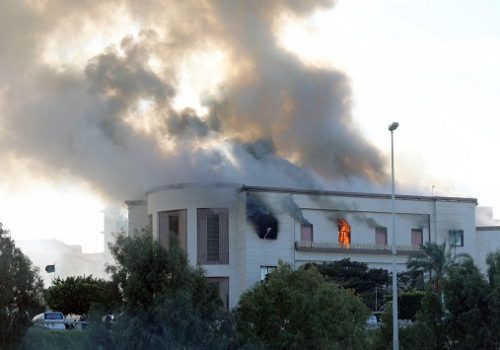Libyan ceasefire agreement faces hurdles due to foreign intervention
The signing of a permanent ceasefire agreement between Libya’s warring factions on October 23 was widely marketed as a watershed moment that would redress the country’s spiraling trajectory. Paving the way for the United Nations-hosted Libyan Political Dialogue Forum to relaunch on October 26, the agreement was also the building block for the first United Nations-mediated meeting inside Libya in years. On November 1, the Joint Military Commission (5+5)—military representatives of the Eastern-based Libyan Arab Armed Forces (LAAF) and the Government of National Accord, who are aligned with General Khalifa Haftar’s Libyan National Army (LNA)—met in the border town of Ghadames to discuss ways to solidify their bare-boned ceasefire agreement. Yet, the international exhilaration that accompanied the launch of these talks obfuscates the very real possibility of a relapse into violent conflict. There are legitimate doubts over the fealty of local and international stakeholders—such as Russia, Turkey and the United Arab Emirates—to the security track’s basic conditions. There is also the overhanging question as to whether the political and economic tracks complementing this very agreement are setting it up for failure by design.
The first hurdle appears to be that there are virtually no coercion or accountability mechanisms that international stakeholders are committed to leveraging against domestic parties that are working to undermine the agreement with the support of foreign actors. Indeed, many have a vested interest and a track record of jettisoning political, economic, or security tracks. The symbolism of the Joint Military Commission meeting in Ghadames—the former host city of the long-awaited April 2019 National Conference—was not lost on Libyans. It may well be that, once again, the potential success of another Ghadames-hosted event is sacrificed on the alluring but ultimately self-defeating altar to accommodate Haftar in a new power-sharing arrangement. More broadly, the fact that Haftar’s 2019 Western Libya offensive—and the sixteen month-long deadly war that ensued—has virtually been swept under the accountability rug sends its own message to him and other self-serving parties.
Moreover, the contemporary emphasis on “Libyan-led” talks among the international community appears to be spawned from a long-running track record of failing to address foreign intervention in the North African country. The protraction of Haftar’s offensive from a blitzkrieg into a sixteen-month long war was neither an exclusively domestic endeavor nor was his forces’ defeat and withdrawal a Libyan-negotiated process. The forcibly-induced route of the LAAF from Tripoli’s suburbs was a geopolitical exercise that excluded Libyans; it was preceded by Turkish-Russian covert talks that ultimately led to the Russian mercenary Wagner Group’s withdrawal toward Sirte and Central Libya, thereby inducing LAAF’s frantic abandonment of their position and the loss of their main forward base. The contemporary format of the security talks not only assumes that Haftar is too beleaguered to spoil the ceasefire again, but it also presumes a degree of Libyan leverage on foreign troops and mercenaries that simply does not exist.
The precariousness of the above mentioned double-bluff is further compounded by the strategic importance of the military facilities and cities which Turkey and Russia retain a presence in.
Turkish forces are entrenching themselves and reinforcing the structures of the military base of Wutiya, one of Libya’s largest airbases, which is strategically located a few hundred miles south of Tripoli and bordering neighboring Tunisia in the northwest. Judging by the magnitude of technical equipment, manpower, and capital injected by the Turkish forces through the airbase, this does not appear to be a temporary presence, but rather a long-term one.
Russia is reciprocating Turkey’s moves at the military base of Jufra in central Libya, a few hundred miles south of the city of Sirte. The LAAF’s nominal control over the coastal city is, in fact, enabled by Russian mercenaries’ heavy presence within it. By way of entrenching themselves in Sirte, the Kremlin-linked Wagner Group is in the strategic position of controlling the lines of defense against a possible attack by the Western Libyan forces while diffusing their presence through the central military airbase of Jufra, the Eastern region of Cyrenaica, and the Southern Libyan region of Fezzan. Their total independence from Haftar’s oft-exaggerated chain of command has already been evinced by their unilateral withdrawal from Tripoli in May—a dynamic which corroborates the assertion that their contemporary maneuvering is coordinated independently from Haftar.
The Wagner Group’s autonomy is hardly an issue Libyans can tackle at the negotiating table. Therefore, not only is the ceasefire vulnerable to Libyan spoilers, but it is also at the mercy of the Kremlin’s strategic whims. The new Russian build-up in Central Libya—bemoaned by United States Africa Command—shows that President Vladimir Putin intends to take advantage of this time window to outflank both the United States and the European Union. While Washington is impeded by a lengthy election process and the potential of a difficult political transition, the EU’s incoherence on Libya is compounded by increasing tensions with the expansionist policies of Turkey’s Recep Tayyip Erdogan.
Gramsci’s mantra of “pessimism of the intellect, optimism of the will” certainly befits the bleak context surrounding Libya’s new dialogue process. Yet, what Libya’s people deserve is not misplaced optimism, but a genuine commitment to crafting a path towards accountability, reconciliation, and peace.
Karim Mezran is a resident senior fellow at the Atlantic Council’s Rafik Hariri Center for the Middle East. Follow him on Twitter: @mezrank.
Emadeddin Badi is a nonresident senior fellow with the Middle East Programs.
Image: Troops loyal to Libya's internationally recognized government patrol the area in Zamzam, near Abu Qareen, Libya September 15, 2020. Picture taken September 15, 2020. REUTERS/Ayman Al-Sahili


